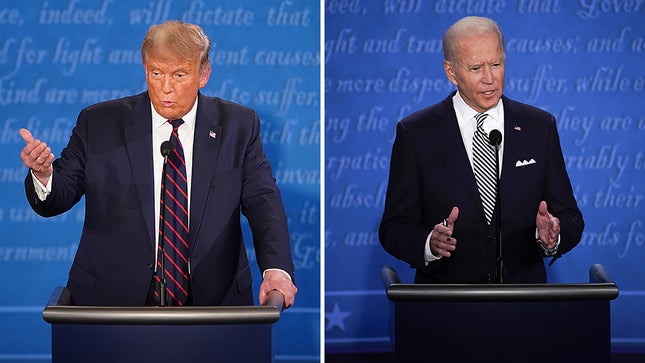
US Election
On 3 November 2020, US citizens will vote for their next president. The lead up to the election is contributing to volatility in global share markets which has only been accentuated by Donald Trump contracting COVID-19. The outcome of the election is likely to have longer term impacts on the global economy, financial assets and geopolitics which is the focus of this newsletter.
Recent presentations by PIMCO and NAB have provided fascinating insights into how the results of the election will likely impact markets, financial assets and economies.
PIMCO pointed out that the most likely outcome of the election is a Democrat clean sweep, with Joe Biden winning the presidency and Democrats controlling Congress with majorities in both the house and the senate. The second likely outcome is the status quo being maintained with Donald Trump winning the presidency, but a divided Congress. Under both scenarios there is expected to be more spending and fiscal stimulus.
Impacts of a Biden victory
PIMCO believe the following are likely to occur if Biden takes control of the White House:
- Significant infrastructure spending with a focus on rebuilding and replacing infrastructure, creating jobs, and spending on renewable energy;
- Healthcare a major priority with emphasis on strengthening the Affordable Care Act (Obamacare) and drug pricing reform;
- Increase the federal minimum wage and paid leave, partially funded by a tax bill (increasing corporate tax rate from 21% to 27%);
- If there is a democratic clean sweep expect wider policy agenda.
NAB also believe that Biden will tighten controls on fossil fuels, the banking sector, and is more likely to agree to global tax proposals for big technology companies.
Higher regulation and increasing taxes is generally negative for equity markets, however this is expected to be offset by the significantly higher spending on infrastructure. This has a multiplier effect as it will create more jobs and has positive spill over effects to other parts of the economy.

Impacts of a Trump victory
PIMCO state the following is likely to occur if Trump maintains control of the White House:
- Infrastructure will also be a priority but not as significant as under the Democrats and more incremental with focus on building highways;
- Bigger focus on industrial policy including tax credits for domestic manufacturing and enticements to repatriate supply chains;
- Greater emphasis on fiscal restraint as the economy recovers.
NAB concur that Republicans will act quickly to reduce the widening budget deficit. In order to do this they will reduce spending rather than increase taxes.
Lower regulation and lower taxes are generally positive for equity markets, however this is also expected to be offset by less spending. Trump is also more likely than Biden to increase tariffs which means lower global trade and is a negative for equity markets and also consumers who pay higher prices.
Equity Markets
Interest rates are expected to remain low for a number of years and regardless of who wins the election there will be likely be greater fiscal stimulus by both parties. This is generally a positive for equity markets despite likely higher taxes and regulation under Biden or higher tariffs under Trump.
Shane Oliver from AMP Capital highlights that historically from 1927-2019 US shares have done better under Democrat presidents with an average return of 14.6% pa compared to 9.8% pa for Republicans, though the best average results of 16.4% pa has occurred with a Democratic president and Republican control of the House, the Senate or both.
Twin Deficit and Currencies
NAB discuss the impacts of a twin deficit where the US still has a current account deficit as it imports more than it exports and has a budget deficit as it spends more than it earns. Historically US twin deficits have meant that the US dollar has depreciated against other currencies therefore the Australian dollar is likely to continue to appreciate against the US dollar. NAB point out that the federal deficit will reach record levels regardless who wins the election though the Republicans will look to reduce this at a faster rate than the Democrats.
Trade Wars
Both the PIMCO and NAB presentations concur that regardless of who wins the election, a cold war with a focus on technology has commenced. The main differences are that Trump will likely be more confrontational and potentially further increase tariffs whereas Biden is more likely to work with allies to create a coalition to pressure China for change.
PIMCO point out that there is bipartisan support to take a tougher stance with China with a majority of US residents having an unfavourable view of the country. Supply chains are likely to be relocated either back to the United States, to neighbouring countries or to regions where demand for final product is greatest. This is likely to lead to greater job creation but also inflation due to the cost of moving supply chains.

Conclusion
We expect volatility in the share markets to continue to be heightened in the short term until there is more certainty around the winner of the election. Longer term, regardless of the outcome, it is expected that there will be greater government spending with the major beneficiaries being in infrastructure, healthcare and energy. This will likely be a positive to share prices for companies in these sectors. The US dollar is likely to continue to depreciate as deficits widen.
From an investment portfolio perspective, we invest with fund managers that invest in infrastructure projects. We can also directly invest in energy and healthcare shares or invest in managed funds that invest in these companies. We also invest with managers that are currency hedged which provides protection against an appreciating Australian dollar.
If you wish to discuss any concerns about the current market or about any strategies to do with your financial plans, do not hesitate to call your Financial Adviser.
Disclaimer: This publication has been compiled by Financial Decisions (AFSL/ACL Number 341678). Past performance is not a reliable indicator of future performance. While every effort has been taken to ensure that the assumptions on which the outlooks given in this publication are based on reasonable data, the outlooks may be based on incorrect assumptions or may not take into account known or unknown risk and uncertainties. Material contained in this publication is an overview or summary only and it should not be considered a comprehensive statement on any matter nor relied upon as such. The information and any advice in this publication do not take into account your personal objectives, financial situation or needs. Therefore you should consider its appropriateness having regard to these factors before acting on it. While the information contained in this publication is based on information obtained from sources believed to be reliable, it has not been independently verified. To the maximum extent permitted by law: (a) no guarantee, representation or warranty is given that any information or advice in this publication is complete, accurate, up-to-date or fit for any purpose; and (b) Financial Decisions nor its employees are in any way liable to you (including for negligence) in respect of any reliance upon such information or advice. October 2020
Contact: Financial Decisions PO Box 484 Mona Vale NSW 1660, T 02 9997 4647, F 02 9997 7407
